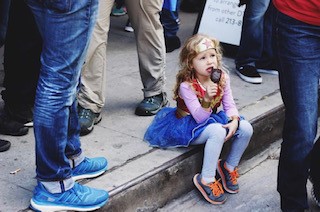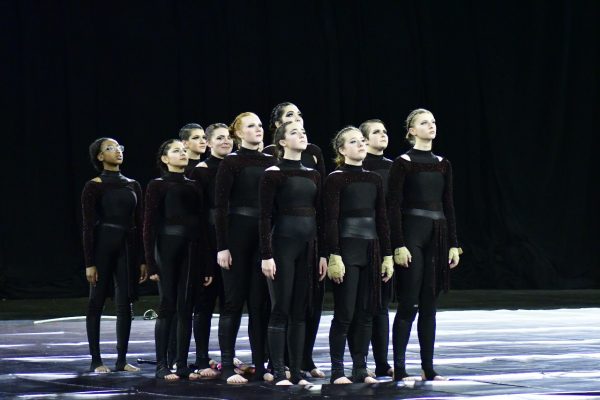Television: The Dilemma Between Right and Wrong

Labeled for Reuse by Creative Commons. A young girl wearing a superhero costume eats ice cream on the sidewalk while watching a crowd pass by.
Have you ever aspired to be a crime-fighting vigilante like Bob Kane’s ‘Caped Crusader,’ or did you fail to grow out of an ‘Indiana Jones’ phase and go on adventures to discover lost treasure? There is no doubt many individuals in society have found themselves being inspired by acclaimed characters and celebrities on our TV channels.
However, just as people can aspire to be more like the ‘Man of Steel,’ is it possible for movie stars and popular cartoon characters to sway the current generation to take a turn for the worse?
“The assertions that violent movies and video games cause kids to become violent have been made for a long time,” Professor of Psychiatry Eugene Beresin proclaims on Psychology Today. “There has, in fact, been extensive research and writing on the impact of violent movies and videos on behavior in kids. Some worry that there is a direct link, while others are concerned that these kinds of activities simply isolate kids or have addictive potential.”
“On the other hand, media research has also demonstrated that television watching can have a beneficial effect as well. Seeing people acting in a positive way can influence how children respond in similar situations,” the Admin Team from Novak Djokovic Foundation wrote.

Society often has blamed firearms and various weapons for certain violent actions that have occurred throughout the last decade, but can society really place the blame on the tools (such as TV and firearms) instead of looking at the real problem? Can society really blame an inanimate object for the way it is used? Guns and television do not have minds of their own as Beresin made clear.
She argues that research lacks a direct causal relationship between violent video games and youth violence.
“Interestingly, the U.S. has the highest homicide rate in the world. But…the Japanese are avid video game players and have a homicide rate close to zero,” Beresin noted.
Therefore, perhaps our favorite movies and tv series are there to stand as positive role models, even those with despicable protagonists. Video gamers cried at the death of vicious outlaw and thief, Arthur Morgan; in Rockstar’s renowned Western game: ‘Red Dead Redemption 2.’ Despite the protagonist’s flaws for being a murderer and thief, he undergoes an incredible transformation for the better allowing the player to admire him, hence the name of the game.
“I do think that films/TV shows influence people, especially if the person in question relates to a character in a story,” Palmer High School Senior Isai Avila informed.
Evangelist and missionary Maggie Rowland believes, “…stories, in and of themselves, have the potential to inspire. If a story is portrayed in a compelling way, the result is emotion followed by inspiration. Films can inspire bravery, honesty, diligence, change, compassion, and love.”
Television and on-screen stories give just as much as they take. “There are many things that influence me and of course, TV/films are one of them. Starting as a serious, not caring guy, to a goofy character, I strive to be more like them (characters),” Avila added.
Despite these positive outcomes in Avila’s life, he felt obliged to also point out the other side:
“I think it can be dangerous to be inspired (by movie characters) for better or for worse even if the inspiration is positive because it’s like trying to be someone you’re not,” Avila reveals that attempting to change your personality may do you more harm than good. “That being said, no. I don’t think it’s a good thing.”
“They can also encourage deceit, hatred, unhealthy comparison, disrespect, or lust. Depending on the content of a film and the way the viewer perceives it, it can benefit or dangerously alter a person’s values,” Rowland contributes to Avila’s remark. “Oftentimes, we believe by seeing. If you watch a film that shows wrong to be right and right to be wrong, this can influence what you believe is good or evil. This is where we must be careful not to let shows and movies alter our values and beliefs.”

Furthermore, what makes characters on screens and in stories so compelling?
“When I admire a characteristic or quality in a person, I reflect on the areas I am weak in and aspire to be better. I try my best to break habits that feed such weakness and remind myself of my ‘goal’ to grow,” Rowland ponders.
So, whether it’s a superhero or Dwayne ‘The Rock’ Johnson that one looks up to; in the end, the responsibility behind the choice to be better falls to the individual at hand. Story characters should not be a harmful matter, nor an atrocity to make our society worse.
Many have found refuge in the idea that people can be more like the idols they admire. Society is largely founded upon a variety of different individuals with contrasting personalities who may find that they relate to unique story characters. Where one person may relate to John Matrix from Arnold Schwarzenegger’s ‘Commando’, another may feel necessary to relate to reserved Teen Titans’ superhero Raven, to describe their introverted side by explaining, “I’m not creepy, I’m just different.”
Whichever remains the case, television, movie stars, and characters can stand strong as positive role models to the world whether or not society decides to see them that way.

How’s it hanging guys? My name is Angel B. Jimenez and it's my first year here at the Jetstream Journal. I’m super excited to explore the corridors...












